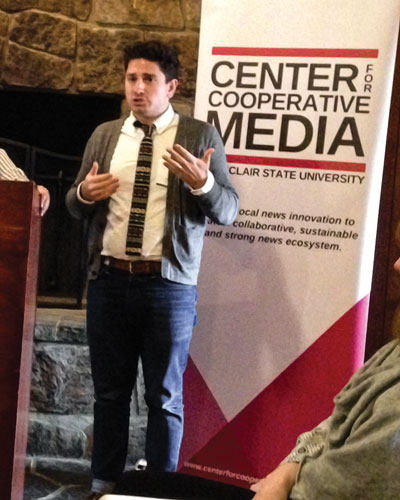The morning thunk of a rolled and bagged newspaper on the sidewalk is a vanishing sound. Nevertheless, the public’s need for local news has not abated. And many people understand that.
One of those acutely aware of the importance of local news coverage is Adele Starrs, Mayor of Knowlton Township, where a long swath of Interstate Route 80 runs through the Delaware Water Gap before crossing into Pennsylvania. The New Jersey Department of Transportation claims, without apparent account, that there have been numerous incidents of rocks falling on the highway, causing accidents. The DOT wants to erect a colossal “Jurassic Park-like” fence that would reach heights of sixty feet along the interstate “S” turns through the Gap, violating the view of one of the state’s most magnificent landmarks.

In a recent telephone interview, Starrs said she never heard anecdotally about these occurrences. “So many accident reports are posted on social media, but none from rock falls,” she said. So she filed state Open Public Records Act requests for information on accidents, but was refused twice. She considers her ally in this fight for information — which also includes questions about why the estimated price for the protective fence has jumped from $6 million to more than $64 million in six years — The New Jersey Herald.
Veteran reporter Bruce Scruton has been on the case for months, she said, trying to obtain information and make sense of the DOT claims. Starrs wrote in an email: “I can’t say enough how critical The New Jersey Herald has been to raising awareness about this issue. They have followed this story from the beginning, not just carrying the headlines, but digging in and requesting records from the State Police about the incidents of rock fall and following up with government officials. The Herald has been key in holding the NJDOT accountable.” Mayor Starrs credits the fact that Scruton has been covering local and county issues for decades. “He’s old fashioned, he digs in. We are fortunate to have him.”
In the early years of Scruton’s career, it wasn’t unusual for local newspapers to have reporters covering every aspect of municipal affairs. Today, it’s a rarity. Daily newspapers have drastically cut municipal coverage. When corporations buy weeklies they often strip them of most of their staff and sometimes close the papers.
When Gannett Company, the national publishing conglomerate, purchased North Jersey Media Group, it closed three weekly newspapers in Passaic, Morris and Sussex counties, leaving the sprawling township of Jefferson with no weekly, and minimal coverage from dailies. Bruce Tomlinson, editor of The Herald, the closest daily, said he had no plans to move into Jefferson Township, a sprawling community in northern Morris County, with no town center and no big advertising base.
The evolving solution to the gap in local news in Jefferson, as in many places, has been an online local news outlet. The Chronicle is run Kevin Pattky, an enthusiastic young man without previous journalistic experience, but with some assistance from former weekly and daily reporters and editors. The Chronicle recently covered a state Boat Regulatory Commission meeting and dispelled a pervasive rumor that the board was considering action on wake boarding on Lake Hopatcong. A number of residents expressed gratitude for that story which would have been routinely covered by several papers years ago.
Many digital outlets are helmed by professional journalists who found themselves taking buyouts from daily papers. An exemplary case is MorristownGreen.com. Kevin Coughlin, a long-time newspaperman at The Star-Ledger, New Jersey’s largest circulated newspaper, helped found the website with the paper the end of 2007. It was a pilot program of the big daily, but when the economy tanked and the paper retrenched, Coughlin left The Ledger “and took the paper with me.”
It was a whole different thing to run an online paper without backup from a daily news organization. “I had some backup from the Morris County bureau,” he said of the early days. “Listings, the calendar, the possibility of taking a day off.” Now, he’s a one-man show.
“I have a number of great volunteers who write, take photos and video,” he said gratefully. When Kevin first started, he had help from another veteran, former editor of The Voice, the newspaper of the Episcopal Diocese of Newark, as well as an editor and reporter at mainstream publications, Sharon Sheridan Hausman.
“She shared my passion for community journalism. She was my moral anchor. When I had an ethical question, she was very grounded. I was fortunate to have her,” Coughlin commented. But Hausman decided to go to seminary and is now an Episcopal priest. Now Coughlin has much less help.
Ethical questions don’t go away for someone who must be reporter, advertising salesperson, editor, and publisher; although the mix of roles was not uncommon in the early days of the American press. A newspaper editor was often an integral member of the community. The late H. Alan Painter was considered the conscience of Hackettstown for many years when he owned and operated The Star-Gazette. Several elected officials lamented his retirement because they knew his coverage of the town would always be fair, and he had institutional memory, something that can be lacking in municipalities that see a turnover from local elections.
It was never easy to perform multiple duties at once. Coughlin finds himself selling ads while creating events and other ways to keep Morristown Green alive. “Advertising alone is not enough,” Coughlin said. “You have to do events. People want to know what’s going on, but nobody ever acknowledged you have to pay for your news.”
Circulation alone never paid for the news, it just barely covered getting the newspaper to the doorstep. “The model has gone away,” Coughlin said. Once profitable classifieds went the way of Craig’s List, and businesses have many other outlets for advertising. Kevin credits the Center for Cooperative Media at Montclair State University for helping him stay afloat. “We are having all sorts of conversations and have collaborated on many levels. Independent sites have their own personalities and voices, but they can come together in meaningful ways.”
The Center runs seminars on insurance, advertising cooperatives and many other aspects of local journalism. Under the direction of Stefanie Murray Anesta and Joe Amditis, the Center and its New Jersey News Commons also aggregate the major stories around the state each day and feature interesting local stories.
Former deputy director at the NJ News Commons, Mary Barr Mann, is now half of The Village Green, along with Carolyn Maynard-Parisi, which covers Maplewood and South Orange. She is hoping for assistance from the State of New Jersey. The state dedicated a portion of profits from the sale of publicly owned bandwidth established in the 1960s to wireless carriers. Some $5 million from the sale is being used to create the Civic Information Consortium to assist with local news. Academics from Montclair State, the New Jersey Institute of Technology, Rutgers, Rowan and The College of New Jersey will serve on the board. Two state politicians will also serve, although the state promises no government interference. The Center for Cooperative Media is housed at a state university, but is funded through grants from the Dodge Foundation and other foundations, so the Civic Information Consortium is a totally new concept.

Mike Rispoli of Free Press, a non-profit that launched efforts to assist local journalism in New Jersey and North Carolina, has been the point person on this effort for more than two years. A former journalist for The Star-Ledger and Gannett, Rispoli organized a lobbying effort to get the state funding over the objections of some journalists who believe it will lead to a dangerous level of government control. Mann believes it will lead to the ability for more county coverage, as well as reporting on public schools, affordable housing and accountability for state spending.
Coughlin said he looked into Patch, a national network of local news websites. “Patch was too top down,” he said. Local editors worked under regional editors who worked under a main office. Few Patch outlets still exist in New Jersey. More successful has been TAPinto. Started as The Alternative Press by attorney Michael Shapiro in New Providence, it now has franchises around the state. Some former daily journalists chose that route. Fred Aun, another former Star-Ledger reporter, runs TAPinto Roxbury. He has the backing of the franchise, but still finds himself writing, editing and selling advertising.

Curtis Leeds, a veteran journalist and former managing editor at the Hunterdon County Democrat newspaper, now runs TAPinto Flemington-Raritan. Leeds recently found himself in the ironic position of being the only member of the press covering the designation of the Union Hotel New Jersey’s first National Historic Site in Journalism. He wrote of the reporters that congregated at the old hotel for weeks: “It was the Crime of the Century and at a time when radio was first establishing itself as an influential medium, Charles Lindbergh may have been the first media superstar. At the historic courthouse, Bruno Richard Hauptmann would be tried and convicted for his role in the kidnapping and death of the twenty-month-old son of the famed aviator. Reporters who covered the trial included household names of their day: Arthur Brisbane, H.L. Mencken, Dorothy Parker, Damon Runyon and Walter Winchell."
Jennifer Dericks who operates TAPinto Sparta and TAPinto Newton was not a professional journalist but grew concerned about local coverage waning in her hometown and county. She is seeking help to expand her franchises and has no problem finding willing experienced writers. But sales staff is a different story.
Although they certainly aren’t getting rich, each of these professionals believes strongly in what they are doing, Many are members of the Society of Professional Journalists and subscribe to its Code of Ethics. Shapiro, an SPJ member, requires his TAPinto franchisees to adhere to the code. Fortunately, none of the local journalists mentioned having a problem with their audience. Of course readers still complain if they feel coverage is incomplete or inaccurate. But they never feel threatened when they take on an issue, nor in any way consider themselves regarded as an “enemy of the people.”